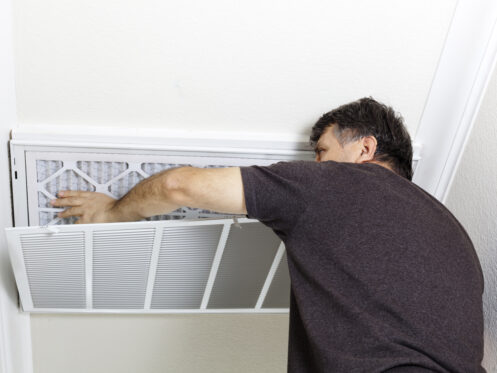It’s easy to overlook your HVAC filter until the air feels stuffy or you find yourself having to dust and vacuum more frequently to keep your home clean. Your heating and cooling system’s air filter plays a major role in your home’s air quality. It traps everything from pet dander and other airborne contaminants that would otherwise circulate through your living spaces and settle on your furniture, carpets, and surfaces. A clean filter doesn’t just protect your system; it helps everyone in your home breathe easier.
Poor Filtration Means More Dust
Even with regular cleaning, dust still returns, often from surprising sources. People track in outdoor particles, furniture sheds fibers, and every time you open a door or window, you let in airborne debris. Your HVAC system pulls that air into the return vents, and without a proper filter in place, that same dust travels through your ductwork and settles across your home.
You’ll often notice it collecting around vent covers, on shelves, or near light fixtures. That stubborn layer of dust that returns no matter how often you clean is a sign your system may be circulating poorly filtered air. A clogged or low-quality filter won’t capture enough fine particles, which can leave your home feeling stuffy and worsen symptoms for family members with respiratory issues such as allergies or asthma.
Filters Catch More Than Just Dust
While dust is easy to spot, it’s only one of the things your air filter helps remove from the air in your home. Bacteria, mold spores, and pet dander also ride the airflow. You might not see them, but you can feel their effects. They may show up as a constant tickle in your throat, a lingering morning cough, or sneezing that seems worse when you spend time at home.
In addition to protecting your HVAC system’s internal components, an air filter’s job is to capture as many airborne irritants as possible before they reach your lungs. Not all filters perform the same. Some are designed to catch only large particles, while others target finer pollutants or even odors. The right filter for your system depends on your home’s layout, any health sensitivities, and the number of people or pets in the house.
If you’re using the wrong filter or if the right one hasn’t been changed in a while, you’re breathing in more airborne contaminants than you should. A clean filter with the correct MERV rating helps remove particles that may not make you sick right away, but can still wear you down over time.
Filter Type Matters More Than You Think
Not all air filters are created equal even if they look similar at first glance. Cheap ones are made from fiberglass and cardboard, while others have deep pleats and multiple layers. Those pleats increase the surface area, which helps the filter catch more particles without choking airflow.
If your filter is too dense for your system, it can reduce airflow and make the blower work harder. That extra strain can increase your energy bills and wear out your HVAC components faster. On the other hand, a filter that’s too basic won’t trap enough debris, letting dust and allergens cycle back through your home.
To find the right balance, check the MERV rating when choosing a filter. That number tells you how effective it is at capturing particles of different sizes. A mid-range MERV filter is fine for most households, but if you have family members with allergies or pets, you might benefit from a higher rating. However, it is essential to ensure that your HVAC system can handle a higher MERV rating without compromising heating and cooling performance.
Air Filters Can Help With Allergies
If your allergies worsen indoors compared to outside, your HVAC filter may be contributing to the issue. Pollen gets inside on clothing, shoes, and pets. Once it’s in, it can spread through the air and settle into carpets, cushions, and bedding. A quality air filter captures pollen before it can cause air quality issues in your house.
You’ll notice the biggest difference in spring and fall when pollen counts are at their highest in Colorado Springs. If your eyes itch more indoors or you wake up congested, your system may be recirculating airborne irritants. A higher-rated filter can trap those particles more effectively.
Some households benefit from filters specifically designed for allergy control. These filters are designed to capture smaller particles, such as pollen. But even the best filters lose efficiency if they’re not replaced when they should be.
How Pets Affect Your Air Filter’s Performance
Living with pets brings a lot of joy, but also a steady stream of hair and dander that ends up in your HVAC system. Even with regular grooming, your filter still has to capture what pets shed into the air. That added strain can reduce the filter’s lifespan and make your system work harder.
Pet hair doesn’t just collect on furniture. It moves through the air with every step, shake, or stretch, eventually settling into your ductwork. Over time, this buildup can limit airflow and reduce efficiency.
If you’ve noticed lingering odors or more dust in rooms your pets spend time in, your filter may be overloaded. Consider using a filter rated for pet households, and check it more frequently than standard recommendations suggest. Staying ahead of buildup helps your system maintain cleaner air and smoother performance.
Knowing When to Change Your Filter
There’s no one-size-fits-all schedule for HVAC filter changes. It depends on the type of filter you use, the size of your home, the number of people living there, and whether you have pets or allergies. Generally, basic fiberglass filters should be replaced every 30 days, while pleated filters typically last up to 90 days. High-efficiency filters may last even longer.
If you’re unsure, a visual check is a good first step. A filter that looks dark gray, feels clogged, or sags when removed has passed its useful lifespan. You might also notice signs like reduced airflow from your vents, increased dust buildup in the home, or your HVAC system running longer than usual. All of these can point to a filter that’s overdue for replacement.
Keep in mind that several factors can shorten a filter’s lifespan. Homes with pets or those that have undergone recent renovations typically need more frequent filter changes. If you live in an area affected by wildfire smoke or frequently keep windows open, outdoor pollutants and dust can also accumulate quickly. Many homeowners inspect their air filters once a month to ensure they know when it is time for a fresh one.
Contact Your Local HVAC Experts
Changing your HVAC filter may seem like a minor step, but it makes a noticeable difference in the cleanliness and comfort of your home. It also helps prevent dust and debris from building up inside your equipment between seasonal maintenance visits. At Alphalete Plumbing Drain Heating & Air, we provide expert filter guidance along with comprehensive HVAC tune-ups and indoor air quality solutions. Contact us today to schedule an appointment with one of our experienced technicians.


